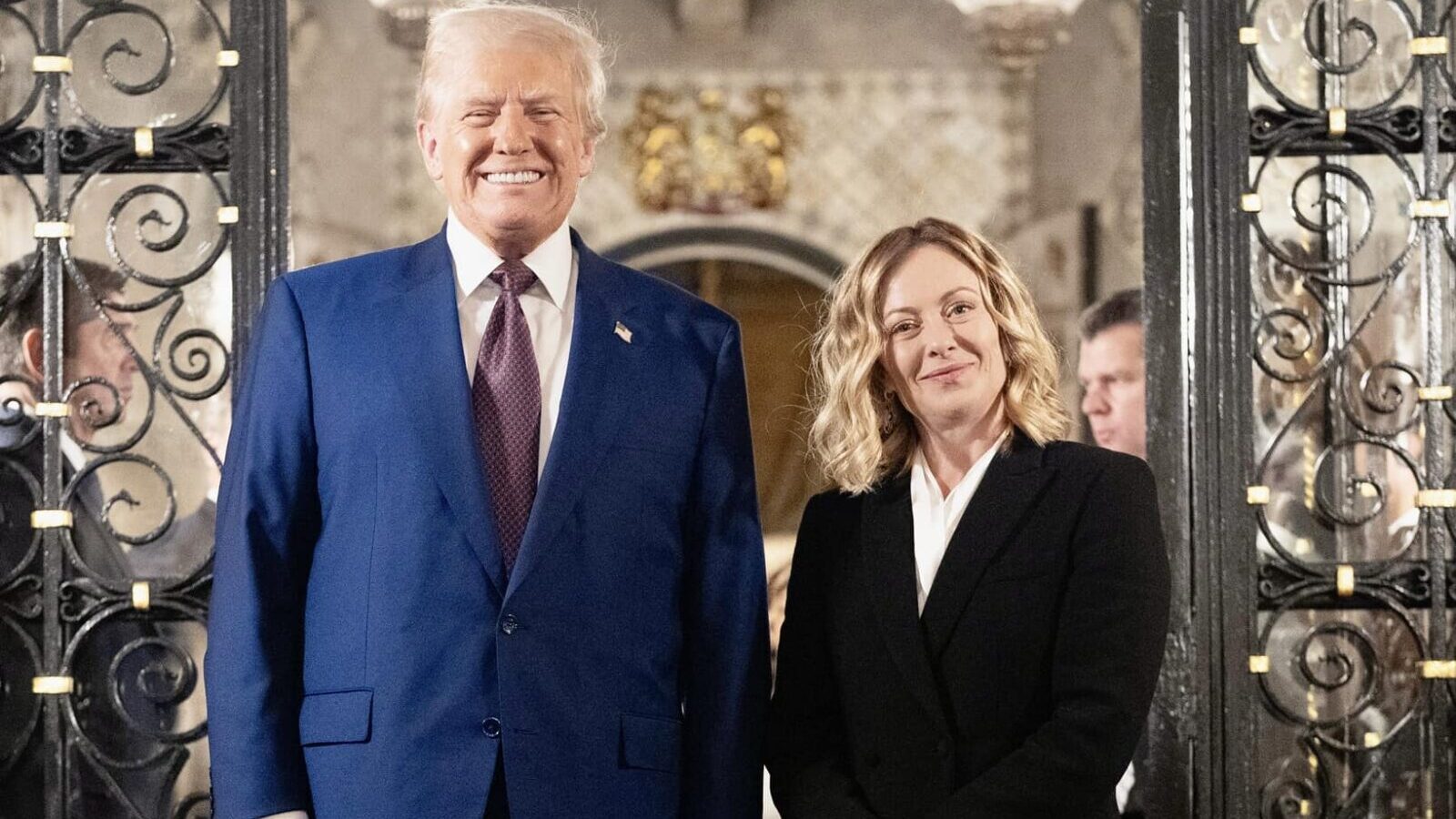
U.S. President-Elect Donald Trump and Italian PM Giorgia Meloni.
Photo: Giorgia Meloni on Facebook, 5 January 2025
Italy’s conservative prime minister Giorgia Meloni (FdI/ECR) traveled to Mar-a-Lago on Saturday, January 4th, to meet with U.S. president-elect Donald Trump ahead of his inauguration later this month, seeking to be seen as Washington’s primary European ally in the next four years.
Although some key differences persist—including on the war in Ukraine—Meloni will undoubtedly serve as an important bridge between Trump and the EU, as no other major European leader can boast a similar good standing with both.
“Lovely evening with Donald Trump who I thank for the welcome,” Meloni posted on X on Sunday, following the unannounced visit the night before. “Ready to work together,” she added.
Bella serata con @realDonaldTrump che ringrazio per l’accoglienza.
— Giorgia Meloni (@GiorgiaMeloni) January 5, 2025
Pronti a lavorare insieme 🇮🇹🇺🇸 pic.twitter.com/ohNSSq1vLg
According to videos shared online, Meloni was greeted with applause after being introduced by the president-elect, who said he was “excited” to meet with “a fantastic woman” like her. “She’s really taken Europe by storm,” Trump added.
No details of the meeting were officially released, but Italian deputy PM Matteo Salvini, the leader of the junior coalition partner Lega (PfE), said that a wide range of issues were covered, including “peace, industrial and commercial cooperation, security, and the freeing of Cecilia Sala,” an Italian journalist detained last month in Iran.
Salvini also congratulated the prime minister for seeking direct cooperation with Trump, especially as most of Europe was hoping for a Democrat victory and spent last year criticizing the incoming president. “While others in Italy and Europe attack and ignore him, we say Go, Donald, Go!” Salvini said.
The trip, which took place just days before outgoing president Joe Biden’s scheduled visit to Rome later this week, was a clear signal of Meloni’s commitment to the Trump administration and her desire to be Washington’s main ally in Europe.
According to Italy’s EU affairs minister Tommaso Foti, the meeting showed that Italy could act as “a diplomatic bridge between two worlds: the European Union and the USA.”
Indeed, there are few national conservative governments in Europe whom Trump can rely on for support and none have a comparable influence in Brussels. After last year’s EU election, Meloni’s remained the only major European government with a strong democratic mandate, which led to Italy gaining an executive vice presidency in the EU Commission and her Fratelli-led conservative ECR group breaking out of its previous isolation in the EU Parliament.
Nonetheless, Meloni is not the only—and not even the most closely aligned—partner in Europe.
Hungary’s PM Viktor Orbán is seen by many in the Trump transition team as a more natural fit, with the two leaders having a close personal relationship that goes back way before Meloni became prime minister. Orbán also visited Trump twice last year, with one meeting taking place months before the U.S. elections, thus making his allegiance clear regardless of the outcome—unlike Meloni.
“It is quite obvious that she had bet that Trump would never return, you can see it from her policies. The bet was wrong, it didn’t pay off,” Trump’s former chief advisor Steve Bannon remarked in an interview with Italian media last month. He also slammed Meloni for “positioning herself with the globalists” like EU Commission chief Ursula von der Leyen and the EU mainstream, and for being “one of the biggest supporters of continuing the war in Ukraine.”
In the eyes of Bannon and other MAGA loyalists, Meloni has shifted too far toward the mainstream—in order to gain influence in Brussels—to be considered a close ally to Trump. Instead, he said incoming the administration will be more in tune with true right-wing populists like Marine Le Pen in France, Nigel Farage in the UK, and Orbán’s Hungary.
This is also why Meloni rushed to pay a last-minute visit to Trump before the inauguration. “Meloni’s setting herself up, and her advisors are working the press incredibly hard, to suggest she’s Trump’s natural interlocutor here in Europe,” an unnamed source close to the transition team told Politico recently. “But Viktor Orbán, both publicly and privately, has been steadfast in his loyalty.”
However, there’s no reason to believe both leaders cannot maintain a good and productive relationship with Trump. After all, Meloni and Orbán also consider each other close allies despite differences such as Ukraine, while Salvini’s Lega party (Meloni’s main domestic ally) sits in Orbán’s European parliamentary group, the Patriots for Europe (PfE). It’s clear that both Hungary and Italy will play an important role in bridging the EU and the U.S. in the coming years.
Brussels. EUCO. Here we go! 😎 pic.twitter.com/4bZZNQGena
— Orbán Viktor (@PM_ViktorOrban) December 18, 2024
